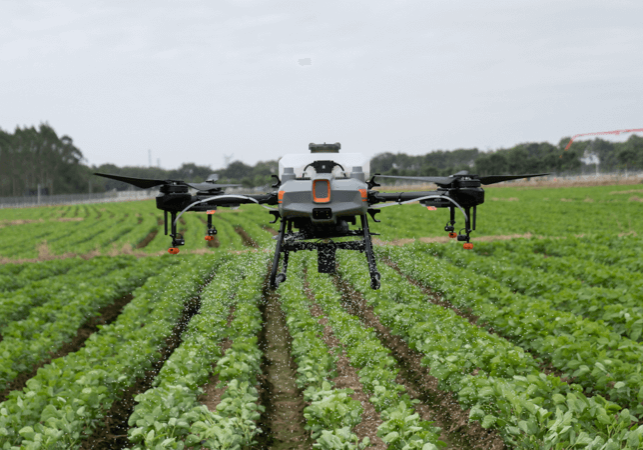Contact Uncrewed Aviation speak to an Ag Specialist today!
Agriculture Drone Pilot Training Requirements
Uncrewed Aviation Australia offers a comprehensive guide to using RPAS for agriculture and farming operations. Continue on below for all essential CASA training and Qualifications required to run Agriculture operations. Here at Uncrewed Aviation, training can be bundled together with Hardware with Packages including our: DJI Agras T50, and AGR B70 Ag Drones. Both packages are designed for precision farming, covering both landholder and commercial certifications, and supports advanced operations like spraying, spreading and seeding, and weed control ensuring efficient, timely and cost-effective practices.
Introduction
As the agricultural industry faces increasing pressure to enhance productivity and reduce environmental impact, drone technology is emerging as a game-changer. Agricultural Remotely Piloted Aircraft Systems (Ag RPAS) offer a highly efficient, cost-effective alternative to traditional manned air-tractors. With their precision and agility, Ag RPAS can remediate crops and land that were previously inaccessible or too risky to treat using manned aerial chemical application.
Additionally, these systems significantly reduce spray drift near waterways and neighbouring crops, ensuring a safer and more environmentally sustainable approach. The sector is experiencing rapid growth, driven by the need for more sustainable practices and advancements in drone technology. Uncrewed Aviation’s comprehensive Ag Remote Pilot Training and Hardware Packages position you at the forefront of this technological revolution, equipping you with the skills and tools needed to thrive in this expanding market.

Understanding the RPAS Agricultural Sector:
Agricultural RPAS (Remotely Piloted Aircraft Systems), commonly known as drones, have revolutionised modern farming practices by providing farmers with an efficient and cost-effective way to monitor, manage, and optimise their crops. These operations include a wide range of activities such as crop monitoring, irrigation management, pest and disease control, and precision spraying of pesticides and fertilisers. Drones equipped with multispectral, thermal, and visual cameras gather crucial data that allows for the creation of detailed maps and models of crop health, moisture levels, and field conditions. This data-driven approach enables farmers to make informed decisions, leading to increased productivity, reduced waste, and optimized use of resources.
- Field Mapping and Monitoring: Capturing high-resolution images and data to create maps for crop health assessment.
- Crop Scouting: Identifying issues like pest infestations, disease outbreaks, and nutrient deficiencies early.
- Precision Agriculture: Applying fertilizers, pesticides, and water in precise amounts to specific areas, reducing costs and environmental impact.
- Livestock Monitoring: Tracking and monitoring livestock, particularly in large or remote areas, ensuring their health and safety.
- Irrigation Management: Assessing moisture levels in the soil to optimize irrigation schedules and improve water use efficiency.
- Yield Estimation: Predicting crop yields by analysing data on plant growth and health.
Getting Your CASA Remote Pilot Licence (RePL)
The CASA Remote Pilot Licence (RePL) is a critical credential for anyone looking to operate drones commercially in Australia. CASA (Civil Aviation Safety Authority) is the governing body that regulates aviation safety in the country, ensuring that all drone operations meet stringent safety and operational standards. Holding a CASA-accredited RePL is not just a legal requirement but a mark of professionalism and competence in the RPAS (Remotely Piloted Aircraft System) industry.
Understanding Land Holder vs. Commercial Operator Certifications
When it comes to operating RPAS for agricultural purposes in Australia, there are distinct certification requirements for landholders using drones on their own property and commercial operators providing services to others. These certifications ensure that operators are knowledgeable and compliant with regulations, and that they conduct their operations safely and legally.
- Basic Operational Approval: Landholders intending to use drones solely on their property for agricultural purposes, such as crop monitoring, pest control, or precision spraying, may be eligible for basic operational approval. This allows them to operate without needing a full Remote Pilot Licence (RePL) if the drone's weight is under 2kg or if they are flying in specific, low-risk scenarios under the sub-2kg exemption.
- Optional RePL Certification: While not mandatory for all landholders, obtaining a CASA RePL (Remote Pilot Licence) can be beneficial, particularly for those using drones that weigh more than 2kg or those planning to undertake more complex operations. The RePL certifies that the landholder is knowledgeable about airspace regulations, safety protocols, and operational procedures, enhancing the safety and effectiveness of their drone usage.
- Specialised Training: Landholders who wish to use drones for specific agricultural tasks, such as aerial spraying of pesticides or fertilizers, may need to complete additional training, such as the ChemCert AQF3 certification. This ensures they are competent in handling and applying chemicals safely and in compliance with environmental regulations.